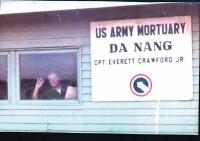One Veteran's Life: Rockets, shrapnel and monsoon season

Tony Dostal waves from inside the office of the mortuary. He served as the contact between the mortuary and Washington, D.C., when there were identification issues.
This is the third in a series of articles about one local veteran, Bay Village resident Anton (Tony) Dostal, who served as a mortician during the Vietnam War. Some of the memories recounted in this article may not be suitable for younger or sensitive readers.
While Specialist Second Class (E-5) Tony Dostal only spent a year in Da Nang, Vietnam, as a mortician, he has a multitude of memories of his experiences during his time there.
He remembers an Army nurse, Lt. Sharon Lane from Canton, Ohio, who was the only American nurse killed as a direct result of hostile fire in June 1969.
“She was hit by shrapnel during a rocket attack and died immediately,” Tony recalled in a recent interview. “It was a piece of clean shrapnel, one simple little wound, that went through her neck. We saw that a lot, a simple piece of shrapnel or a single bullet would end a soldier’s life.”
Tony was used to seeing bodies, but at times, it was horrific.
“I think it was the first week we were there, the day crew was sitting outside the barracks and they saw one of our choppers get hit and drop. The next night, they brought in an almost cremated body only 3 feet long; it was the pilot from the helicopter.”
When body bags were brought into the embalming facility it was sometimes a shock, even to Tony, a trained mortician, to see what was inside. “I hated it opening the bag. My mind couldn’t adjust to the abnormality of what was going to in be there.”
Bullets, shrapnel and rockets were not the only hazards of soldiers in the field.
“One night a Marine was on guard duty and a tiger got him and killed him. Then, there were the three Marines who were captured by the Viet Cong and buried alive until our troops found them and brought them to us.”
Because the compound was under frequent attack, the Army decided to clear the vegetation around the camp so the guards could see farther. There were barrels of chemicals at the base which were put on airplanes and sprayed to clear the vegetation.
“I later found out that was Agent Orange [an herbicide that is highly toxic]. They put Marines with dogs out in the cleared field for five days. One handler told me he slept out there with his German shepherd. He said the dogs could hear the enemy before he could.”
Tony witnessed many heartbreaking and gruesome moments while in Vietnam. Besides casualties from enemy forces, friendly fire deaths also happened during the chaos of war.
“One night, the same German shepherd mentioned earlier attacked South Vietnamese soldiers that had broken into our warehouse and tore into them.”
Even U.S. soldiers met with cruel death, Tony said. “Some of our soldiers returning from night patrol used the wrong password and were shot by compound sentries.” Many of the American casualties eventually came to the mortuary to be identified and embalmed.
Even being new to the camp was risky. “New recruits had a three-day orientation program training them to go out into the field. During one of the exercises, a sergeant would toss a dummy grenade among them. The reason they did that was to see how they’d react, and to be prepared if a grenade came their way. But in one instance it was not a dummy grenade and three soldiers were killed. That’s just an example of friendly fire that not many people know about.”
Besides the bombs and bodies, the soldiers had to deal with the hot, oppressive weather.
“During the monsoon season, we walked on pallets for sidewalks. The heavy rains became the entertainment for the day crew, who were there to watch this mess going down on the road. They’d sit on these sandbags drinking beer and cheering the jeeps and trucks that would get buried almost in a hole, because of the rain. Oh gosh, it was entertainment. To keep me dry, my wife, Judy, sent me a rain suit, but the first time I wore it, I sweated even more under all that.”
August 1969 was the last month Tony was in the country. He didn't have to go into the mortuary and was basically on R&R for two weeks before heading home. But then another rocket attack came.
“The compound came under an attack, and I got under a desk as the rockets roared in. A rocket hit the embalming fluid barrels outside and exploded, blowing up debris and shrapnel pieces all over the place.” A final reminder that you were never really safe in Vietnam.
Tony’s tour of duty in Vietnam was over, now it was time for him to return home. On Aug. 22, 1969, Tony boarded a DC-8 aircraft for the U.S. “I was glad to be on the plane. It was a big relief as the plane rolled down the runway and lifted into the air. I was lucky.”
In the next issue, Tony’s life after Vietnam.
